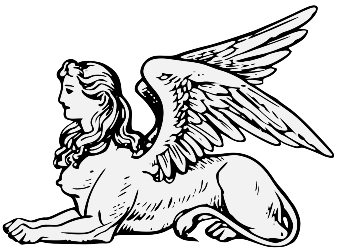
Aeneas flees Troy with Ascanius, Anchises and Creusa
Aeneas, also spelt Æneas, was the son of Anchises, King of Dardania, and Aphrodite. He was the cousin of Hector and Paris, and also their brother-in-law. He was married to Creusa, daughter of Priam of Troy (the father of Hector and Paris). Aeneas led the Dardanians against the invading Greeks during the Trojan War. After the sack of Troy, he escaped with his father, son and wife. He and his followers eventually settled in Italy, founding Alba Longa and eventually Rome.
In the Aeneid[]
Aeneas is the subject of Virgil's Aeneid, which recounts his flight from Troy and settlement in Italy. It is comprised of 12 books.
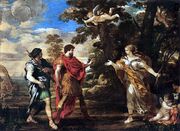
Venus appears to Aeneas
Journey to Italy[]
Flight from Troy[]
the Aeneid begins with the Trojan fleet sailing towards Italy. Juno (Hera) however, deeply resents the Trojans because Paris awarded the golden apple toVenus (Aphrodite). Juno was also angry with Troy because a former Trojan prince (Ganymede) was chosen as cup-bearer for the gods, thus replacing Juventas (Hebe). Juno apporaches Aeolus, the lord of the winds. Juno attempts to win his cooperation with the promise of a beautiful wife, but Aeolus refuses. He still complies with her orders and sends a storm to devastate Aeneas' fleet.
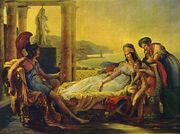
Aeneas recounts his adventures to Dido
Neptune (Poseidon) however, is furious at Juno's intrusion into his domain and calms the seas. Aeneas' fleet shelters in Africa, where Aeneas is met by his mother (Venus) in disguise. Aeneas then proceeds to the city of Carthage, where he wins the affections of Queen Dido, the founder of the city.
The Sack of Troy[]
At a feast held for him, Aeneas recount the tale of the Trojan War, speaking of Ulysses (Odysseus) devising the Trojan horse trick. He tells the Carthaginians of how Laocoön, the priest of Neptune, opposed bringing the horse into the city, but was killed (alongside his sons) by sea serpents. He then talks of the Greek soldiers hidden in the horse, who opened the gates of Troy, allowing the Greek army to return and sack the city.
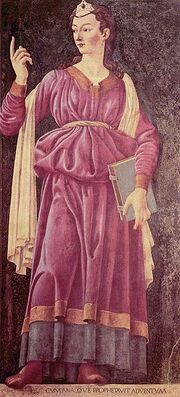
Sibyl of Cumae
Hector appeared to Aeneas in a dream and warned him to flee the city with his followers. He witnessed the murder of his uncle, King Priam, by Neoptolemus (son of Achilles). Aeneas was led back to his house by his mother, where he prepares his father, son and wife to leave.
Aeneas speaks of how he led the survivors onto ships and fled to Thrace, the Strophades, (where they encounter Celaeno the harpy), Crete (where they meet Apollo, who tells them to sail westward) and Buthrotum. In Buthrotum, Aeneas meets Andromache, widow of Hector, and Helenus, Hector's brother. they have survived the sack of Troy and became prisoners of Neoptolemus. Helenus, who has the gift of prophecy (which he learnt from Cassandra) tells Aeneas to proceed to Italy and find the Cumaean Sibyl.
Aeneas proceeds to recount fleet sailing westward, towards Sicily, where they escape Charybdis and find Achaemenides, a Greek left by Ulysses in the cave of Polyphemus the Cyclops. Aeneas rescues Achaemenides and escapes the islands with his ships. Anchises soon dies of old age and is buried on Sicily.
Leaving Carthage[]
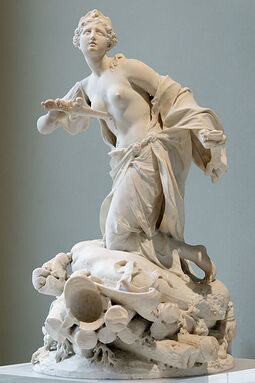
The suicide of Queen Dido
Venus sends her son Amor (Eros) to pose as Ascanius. Dido falls in love with Aeneas upon realising her motherly love for Ascanius. Aeneas returns Dido's love and they go on a hunting expedition. During a storm, they retreat to a cave, in which it is implied they have sex. Aeneas attempts to stay in Carthage but Jupiter (Zeus) sends Mercury (Hermes) to remind Aeneas of his duty to settle in Italy. Aeneas decides to leave but, before his ships are out of sight of Carthage, he sees Dido's servants build a funeral pyre. the Queen of Carthage commits suicide by impaling herself on Aeneas' sword, cursing him and his descendants with her dying breath:
- Thou Sun, who view'st at once the world below;
- Thou Juno, guardian of the nuptial vow;
- Thou Hecate hearken from thy dark abodes!
- Ye Furies, fiends, and violated gods,
- All pow'rs invok'd with Dido's dying breath,
- Attend her curses and avenge her death!
- If so the Fates ordain, Jove commands,
- Th' ungrateful wretch should find the Latian lands,
- Yet let a race untam'd, and haughty foes,
- His peaceful entrance with dire arms oppose:
- Oppress'd with numbers in th' unequal field,
- His men discourag'd, and himself expell'd,
- Let him for succor sue from place to place,
- Torn from his subjects, and his son's embrace.
- First, let him see his friends in battle slain,
- And their untimely fate lament in vain;
- And when, at length, the cruel war shall cease,
- On hard conditions may he buy his peace:
- Nor let him then enjoy supreme command;
- But fall, untimely, by some hostile hand,
- And lie unburied on the barren sand!
- These are my pray'rs, and this my dying will;
- And you, my Tyrians, ev'ry curse fulfil.
- Perpetual hate and mortal wars proclaim,
- Against the prince, the people, and the name.
- These grateful off'rings on my grave bestow;
- Nor league, nor love, the hostile nations know!
- Now, and from hence, in ev'ry future age,
- When rage excites your arms, and strength supplies the rage
- Rise some avenger of our Libyan blood,
- With fire and sword pursue the perjur'd brood;
- Our arms, our seas, our shores, oppos'd to theirs;
- And the same hate descend on all our heirs!"
- ...
- "Dear pledges of my love, while Heav'n so pleas'd,
- Receive a soul, of mortal anguish eas'd:
- My fatal course is finish'd; and I go,
- A glorious name, among the ghosts below.
- A lofty city by my hands is rais'd,
- Pygmalion punish'd, and my lord appeas'd.
- What could my fortune have afforded more,
- Had the false Trojan never touch'd my shore!"
- Then kiss'd the couch; and, "Must I die," she said,
- "And unreveng'd? 'T is doubly to be dead!
- Yet ev'n this death with pleasure I receive:
- On any terms, 't is better than to live.
- These flames, from far, may the false Trojan view;
- These boding omens his base flight pursue!"
- (Aeneid Book 4)
the "avenger" of Libyan blood is a reference to Hannibal Barca and she foretells Aeneas' struggles with the native Latin inhabitants of Italy.
Sicily[]
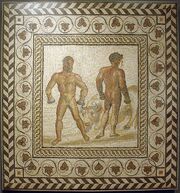
The boxing match
Aeneas arrives in Sicily on the anniversary of his father's death. He decides to host a funeral games compirisng of boxing matches, archery competitions, foot races and boat races. Juno disguises herself and incites the Trojan women to burn the ships, however Jupiter intervenes and quenches the fire with torrential rain. Aeneas has a vision of his father, who instructs him to journey to the Underworld.
In Italy[]
After taking counsel with his dead father in the Underworld, Aeneas arrived on the west coast of Italy. Latinus, King of Latium, had been told by his father's spirit that his daughter would wed a foreigner, and bear children of a race that would come to dominate the earth. Because of this prophecy, Latinus received Aeneas with open arms and offered his daughter's hand in marriage.
Ascanius Kills the Stag
All was not well for long. Ascanius, Aeneas' son, was out hunting, and seeing a stag lying in the woods, he shot an arrow and gravely injured it. This stag was not wild, and it ran back to its master's house where it died. This caused much grief, as its family cherished it, and all the the families of the neighboring farms knew it and protected it. the news of the slaying spread quickly, and all the Latins and the Rutulians took up arms against the Trojans. Latinus did not intervene, and instead shut his gates.
the Etruscans
the Trojans struggled against the opposing army, as their enemies were much greater in number and led by Turnus and his vicious lieutenent, Mezentius. Aeneas, hearing of a mighty people called the Etruscans, left to lobby their support. After some time, he returns with an Etruscan army and saves the camp, killing Turnus in single combat. Aeneas goes on to marry Lavinia and founds the Roman race.
Family[]
| |||||||||||||||||||||||||||||||||||||||||||||||||||||||||||||||||||||||||||||||||||||||||||||||||||||||||||||||||||||||||||||||||||||||||||||||||||||||||||||||||||||||||||||||||||||||||||||||||||||||||||||||||||||||||||||||||||||||||||||||||||||||||||||||||||||||||||||||||||||||||||||||||||||||||||||||||||||||||||||||||||||||||||||||||||||||||||||||||||||||||||||||||||||||||||||||||||||||||||||||||||||||||||||||||||||||||||||||||||||||||||||||||||||||||||||||||||||||||||||||||||||||||||||||||||||||||||||||||||||||||||||||||||||||||||||||||||||||||||||||||||||||||||||||||||||||||||||||||||||||||||||||||||||||||||||||||||||||||||||||||||||||||||||||||||||||||||||||||||||||||||||||||||||||||||||||||||||||||||||||||||||||||||||||||||||||||||||||||||||||||||||||||||||||||||||||||||||||||||||||||||||||||||||||||||||||||||||||||||||||||||||||||||||||||||||||||||||||||||||||||||||||||||||||||||||||||||||||||||||||||||||||||||||||||||||||||||||||||||||||||||||||||||||||||||||||||||||||||||||||
| Preceded by: None (Title Created) |
King of Alba Longa Mythic |
Succeeded by Ascanius |
